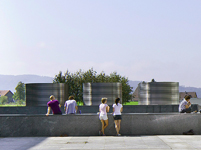Climate Change Conference 2009
Climate Change Conference 2009
Success in Copenhagen? A panel discussion debates.

Contrary
to many reports in the media, a panel discussion on the 1st December
2009 issued a fundamentally positive attitude. Never before have so many
important political leaders confirmed their presence at a World Climate
Summit and rarely has the pressure and conviction to finally take joint
steps against global climate change been as strong as now. For this
reason, one can hope that the momentum will be used and that the COP-15
in Copenhagen will bring with it, if not an internationally binding
agreement, sufficiently large, sufficiently believable and sufficiently
sanctioned reductions in emissions in many countries across the globe.
Experienced negotiators and members of the Swiss delegation at COP-15 such as Andreas Fischlin (ETH Zurich and joint Nobel Peace Prize winner 2007) and Patrick Hofstetter (Leader of Climate Politics at the WWF) reassured the general public but also highlighted the key questions and problems of the World Climate Summit:
- In developing countries, more modern and low-carbon technologies have to be implemented. Under what conditions could this be realised?
- The division of countries up until now into those committed to reductions (Annex I) and those who are not (Non-Annex I) seems to be neither up-to-date nor useful. How can this be overcome? What role does the historical responsibility for emissions on the one hand and economic performance on the other play?
- An important instrument to the abatement of global warming is the reduction of emissions from deforestation and damage to forests (REDD). How would the details of an efficient REDD strategy look?
- Strategies to fight global warming involve heavy costs. Which countries can or should offer how much financial backing for these purposes and for what and according to what rules should this money be spent?
Peter Niggli from the Alliance Sud indicated that the group of developing countries was extremely heterogenous, starting with China with already high CO2 emissions per capita, over India with yet considerably lower CO2 emissions per capita, to countries such as Mali or Niger that will have very low CO2 emissions per capita even after thirty years of economic growth. Also from his side, there was positive news: he reported on the clear readiness of some developing countries to limit the increase in their emissions and take responsibility for the future in spite of the historical development in emissions. Malte Schneider of the Sustec professorship at the ETH and currently active at the UNCTAD in Geneva, rounded up the positive predictions. For many companies, with the right parameters, climate protection makes economic sense. Surely politics should be able to follow the comparatively pragmatic approach of businesses.
The conclusion for listeners: none of the instruments discussed can solve the climate problem alone, only an intelligent combination of instruments is even feasible. In Copenhagen, a solution has to be found for the years that follow 2012 –the chances of this are better than ever before.
Link for the podcast of the event.









